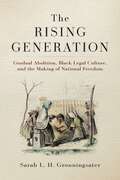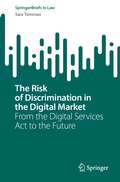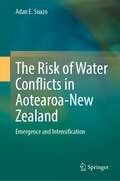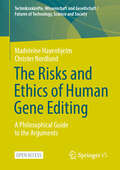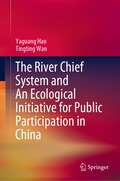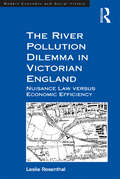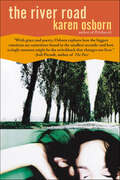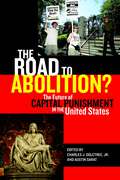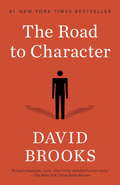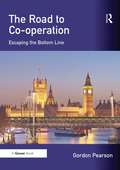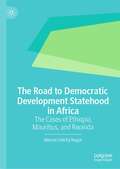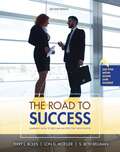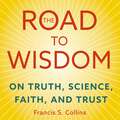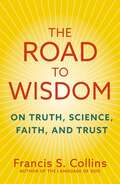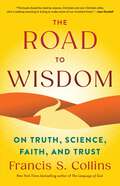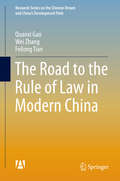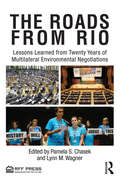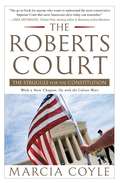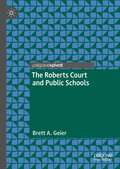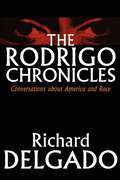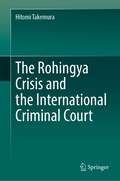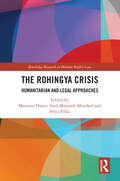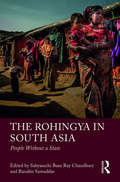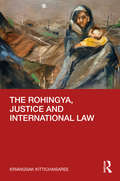- Table View
- List View
The Rising Generation: Gradual Abolition, Black Legal Culture, and the Making of National Freedom (Early American Studies)
by Sarah L. GronningsaterChronicles the history of emancipation through the cradle-to-grave experiences of a remarkable generation of black northernersThe Rising Generation chronicles the long history of emancipation in the United States through the cradle-to-grave experiences of a generation of black New Yorkers. Born into precarious freedom after the American Revolution and reaching adulthood in the lead-up to the Civil War, this remarkable generation ultimately played an outsized role in political and legal conflicts over slavery’s future, influencing both the nation’s path to the Civil War and changes to the US Constitution.Through exhaustive research in archives across New York State, where the largest enslaved population in the North resided at the time of the American Revolution, Sarah L. H. Gronningsater begins by exploring how English colonial laws shaped late eighteenth-century gradual abolition acts that freed children born to enslaved mothers. The boys and girls affected by these laws were born into a quasi-free legal status. They were technically not enslaved but were nonetheless required to labor as servants until they reached adulthood. Parents, teachers, and mentors of these “children of gradual abolition” found multiple ways to protect and nurture the boys and girls in their midst. They supported and founded schools, formed ties with white lawyers and abolitionists, petitioned local and state officials for better laws, guarded against kidnapping and cruelty, and shaped New York’s evolving identity as a free state. Black fathers used their votes during annual state elections in the early 1800s to influence legislative antislavery efforts. After many but not all black men in the state were disfranchised by a race-based property requirement in 1822, black citizens across New York organized to regain equal suffrage and to expand and protect other crucial, non-gendered features of state citizenship. Women and children were critical participants in these efforts.Gronningsater shows how, as the children of gradual abolition reached adulthood, they took the lessons of their youth into midcentury campaigns for legal equality, political inclusion, equitable common school education, and the expansion of freedom across the nation.
The Risk of Discrimination in the Digital Market: From the Digital Services Act to the Future (SpringerBriefs in Law)
by Sara TommasiThe book starts with an analysis of what is new in the Digital Services Act. The aim is to see whether this new Regulation is appropriate both for not halting technological innovation and for addressing the risks that technological innovation poses to society and to the people who use digital services. The focal point is the risk of discrimination as people are often helpless in the face of the potential discriminations in the digital services sector. In particular, the book analyses how the Digital Services Act can make a concrete contribution to the protection against discrimination. To this end, it focuses on the responsibility of digital service providers and the fact that discrimination may also depend on the way in which algorithms and artificial intelligence systems are used. Therefore, a comparison is made between the Digital Services Act and the proposed Artificial Intelligence Act. The comparison discloses that the risk-based approach is the common thread followed by the EU in regulating the digital market. The book elaborates also on the practical implications of the risk-based approach. Highlighting advantages and limitations leading the author to conclude that the risk-based approach is the way forward only if the differences between risk and danger, the limits of law, and the limits of the tendency to humanise artificial intelligence systems are considered. With specific reference to the risk of discrimination, the need for a systemic and multi-level approach is highlighted, which reinforces the contribution that can be made not only by the Digital Services Act, but also by more general and cross-cutting legislation as those on data protection and unfair commercial practices.
The Risk of Water Conflicts in Aotearoa-New Zealand: Emergence and Intensification
by Adan E. SuazoThis book focuses on water disputes in New Zealand: a country where such conflicts are assumed to be non-existing. Rarely are water disputes examined in areas where water resources abound, and where the political framework that governs their access and use is strong. Environmental security literature has devoted a significant amount of attention to the nexus between resource abundance and conflict. Important research has assessed this relationship by focusing on non-renewable resource wealth as a causal determinant of conflict, but little is known about the conditions that influence the emergence and intensification of conflict in water abundant environments. By most accounts, New Zealand is one of the most water-rich countries in the world. Even though violent conflict over water does not normally materialize in New Zealand, conflicts and incompatible claims motivated by water bottling, the growth of some types of agriculture, tourism, and water treatment strategies, continue to surface. Little, however, is known about how and why these conflicts emerge and intensify in a country such as New Zealand. To address this lacuna, this project asks the following research question: How and why does the commercialization of freshwater influence the emergence and intensification of hydropolitical conflict in New Zealand? This study presents two central arguments. First, that the introduction of a commercial enterprise motivates the emergence of hydropolitical conflict intentionality if the enterprise is incompatible with the interests of local communities. And second, hydropolitical conflict risk intensifies in accordance with the level of trust that communities pose upon the approval and appeals process that supports a commercial operation. To test these arguments, this study examines the effects of water bottling and water chlorination on the towns of Ashburton (Canterbury) and Glenorchy (Otago), by employing a tripartite analysis comprised, first, of a conflict intentionality and engagement assessment, second, of a comparative case study analysis, and third, of a conflict intentionality classification. The data suggests that hydropolitical conflict risk is low when communities trust the approval and appeals process behind any given commercial operation. Water-based conflict risk however is likely to escalate when local communities lose trust in the above processes and the institutions that administer them.
The Risks and Ethics of Human Gene Editing: A Philosophical Guide to the Arguments (Technikzukünfte, Wissenschaft und Gesellschaft / Futures of Technology, Science and Society)
by Madeleine Hayenhjelm Christer NordlundThis Open Access book is about the risks and the ethics of human germline gene editing, i.e., the possibility to make heritable changes to the DNA of early human embryos or germ cells. Is there something particularly morally problematic about editing the human germline? Is there something unique about germline editing, and, if so, does this suggest that we ought not to edit the human germline, or only in particular circumstances or for particular purposes? What would be a wise and responsible approach to editing the human germline from a moral perspective? The book has three broad aims. First, to present an inclusive map over the current scholarly debate on the ethics of human germline gene editing. Second, to provide a philosophical and critical guide to the various ideas and arguments in this debate. Third, to apply an ethics of risk perspective and defend a morally cautious position on human germline gene editing.
The River Chief System and An Ecological Initiative for Public Participation in China
by Yaguang Hao Tingting WanThis book provides an alternative agenda to deepening the understanding of the River Chief System as a distinctive responsibility approach to solve water pollution and associated governance dilemmas. Insightful analysis is performed through in-depth studies of the origins of China’s River Chief System, responsibility mechanisms, governmental and civil river chiefs, formal and informal water governing institutions, public participation, empowerment with accountability, and the environmental impact.
The River Pollution Dilemma in Victorian England: Nuisance Law versus Economic Efficiency (Modern Economic And Social History Ser.)
by Leslie RosenthalNineteenth-century Britain witnessed a dramatic increase in its town population, as a hitherto largely rural economy transformed itself into an urban one. Though the political and social issues arising from these events are well-known, little is known about how the British legal process coped with the everyday strains that emerged from the unprecedented scale of these changes. This book explores the river pollution dilemma faced by the British courts during the second half of the nineteenth century when the legal process had to confront the new incompatible realities arising from the increasing amounts of untreatable waste flowing into the rivers. This dilemma struck at the heart of both Victorian urban and rural society, as the necessary sanitary reformation of the swelling cities and expanding industry increasingly poisoned the rivers, threatening the countryside and agricultural rents and livelihoods. Focusing on ten legal disputes, the book investigates the dilemma that faced the courts; namely how to protect the traditional and valued rights of landholders whose rivers and lands were being polluted by industrial waste and untreated sewage, whilst not hindering the progress of sanitary reform and economic progress in the towns. The case studies considered involve major industrialising centres, such as Birmingham, Leeds, Northampton, Wolverhampton and Barnsley, but also include smaller towns such as Tunbridge Wells, Leamington Spa and Harrogate. The fundamental issues raised remain as important today as they did in Victorian times. The need for the courts to balance a variety of conflicting needs and rights within the limits of contemporary technological capabilities often played out in surprising ways, with outcomes not always in line with theoretical expectations. As such the historical context of the disputes provide fascinating insights into nineteenth-century legal process, and the environmental and social attitudes of the times.
The River Road: A Novel
by Karen OsbornDavid and Michael Sanderson are brothers, inseparable since childhood from each other and from their neighbor Kay Richards, a complicated young woman involved in a passionate and obsessive love affair with David. One spring night, while at home on a break from college, the threesome embarks on a night of adventure and experimentation, driving recklessly through the Connecticut Valley. Stopping at the French King Bridge, David -- full of hubris and hallucinogens -- dares to jump, mistakenly believing he'll be able to swim ashore. With this one act, he sets in motion an inexorable chain of events that indelibly alters the lives of everyone involved.Told through the alternating voices of Kay, Michael, and David's father, Kevin, The River Road is a closely observed and psychologically penetrating narrative of the accusations, murder investigation, and courtroom battle that follow.
The Road to Abolition?: The Future of Capital Punishment in the United States (The Charles Hamilton Houston Institute Series on Race and Justice #5)
by Austin Sarat Charles J. Ogletree JrAt the start of the twenty-first century, America is in the midst of a profound national reconsideration of the death penalty. There has been a dramatic decline in the number of people being sentenced to death as well as executed, exonerations have become common, and the number of states abolishing the death penalty is on the rise. The essays featured in The Road to Abolition? track this shift in attitudes toward capital punishment, and consider whether or not the death penalty will ever be abolished in America.The interdisciplinary group of experts gathered by Charles J. Ogletree Jr., and Austin Sarat ask and attempt to answer the hard questions that need to be addressed if the death penalty is to be abolished. Will the death penalty end only to be replaced with life in prison without parole? Will life without the possibility of parole become, in essence, the new death penalty? For abolitionists, might that be a pyrrhic victory? The contributors discuss how the death penalty might be abolished, with particular emphasis on the current debate over lethal injection as a case study on why and how the elimination of certain forms of execution might provide a model for the larger abolition of the death penalty.
The Road to Character
by David Brooks"I wrote this book not sure I could follow the road to character, but I wanted at least to know what the road looks like and how other people have trodden it."--David Brooks<P><P> With the wisdom, humor, curiosity, and sharp insights that have brought millions of readers to his New York Times column and his previous bestsellers, David Brooks has consistently illuminated our daily lives in surprising and original ways. In The Social Animal, he explored the neuroscience of human connection and how we can flourish together. Now, in The Road to Character, he focuses on the deeper values that should inform our lives. Responding to what he calls the culture of the Big Me, which emphasizes external success, Brooks challenges us, and himself, to rebalance the scales between our "résumé virtues"--achieving wealth, fame, and status--and our "eulogy virtues," those that exist at the core of our being: kindness, bravery, honesty, or faithfulness, focusing on what kind of relationships we have formed.<P> Looking to some of the world's greatest thinkers and inspiring leaders, Brooks explores how, through internal struggle and a sense of their own limitations, they have built a strong inner character. Labor activist Frances Perkins understood the need to suppress parts of herself so that she could be an instrument in a larger cause. Dwight Eisenhower organized his life not around impulsive self-expression but considered self-restraint. Dorothy Day, a devout Catholic convert and champion of the poor, learned as a young woman the vocabulary of simplicity and surrender. Civil rights pioneers A. Philip Randolph and Bayard Rustin learned reticence and the logic of self-discipline, the need to distrust oneself even while waging a noble crusade.<P> Blending psychology, politics, spirituality, and confessional, The Road to Character provides an opportunity for us to rethink our priorities, and strive to build rich inner lives marked by humility and moral depth.<P> "Joy," David Brooks writes, "is a byproduct experienced by people who are aiming for something else. But it comes."
The Road to Co-operation: Escaping the Bottom Line
by Gordon PearsonThis critical and informed protest against the absurdity and dishonesty of neoclassical economic theory as it has progressed through the 20th century down to the present, sheds new light on the predicament faced in 2012. In The Road to Co-operation, Pearson highlights the dangers of using unrealistic mathematical models of human, organisational and market behaviour to guide policy prescriptions. He shows the damage done to real economies, markets, firms and people, by the unwarranted trust in unregulated markets, proclaimed by Friedman and colleagues, promulgated by academia and adopted by the financial-political-corporate nexus, now dominant in Anglo-American jurisdictions. Though real markets work better than known alternatives, Pearson makes the crucial distinction between the real and the speculative-financial, where totally different realities apply. Failure to make that distinction has transformed financial sectors from supportive of the real economy, to exploitative and sometimes fraudulent. Pearson provides a comparative analysis of corporate governance theory, law, and practice in different jurisdictions, including the self-destruction of post-mature Anglo-American governance with the more robust custom and practice in the industrial economies of Germany and Japan and emerging economies of China and India, which all exercise care for their real economic strengths and provide object lessons for governance in UK and US. The Road to Co-operation proposes realistic changes in policy and practice, in the context of sustainability, which would be prerequisite to recapturing real long term economic success on a co-operative and non-exploitative foundation. It will be invaluable for today's business faculty, students and practitioners as well as the 'madmen in authority'.
The Road to Democratic Development Statehood in Africa: The Cases of Ethiopia, Mauritius, and Rwanda
by Marcel Felicity NagarThis book interrogates Africa’s pursuit of the Democratic Developmental State model by drawing on the experiences of Mauritius, Ethiopia, and Rwanda. It comprises of five parts: Part I, consisting of two chapters, outlines the key conceptual and theoretical approaches used throughout the book’s discussions. The proceeding parts II, III and IV critically analyses the three case studies under review. Each part is subdivided into two chapters wherein a historical state-societal approach is employed in interrogating the extent to which Mauritius, Ethiopia, and Rwanda have been able to successfully achieve democratic development, on the one hand, and, conversely, inclusive economic growth and development, on the other. Part V, and Chapter 10 debuts the concept and model of the Developmental Civil Society.
The Road to Success: Learning How to Become an Effective Negotiator
by Terry L. Boles Lon D. Moeller S. Beth BellmanThis book aimed at the undergraduate population, compares learning to negotiate to learning to drive. Like driving, negotiation is a teachable skill that involves self-assessment, situation assessment, and lots of practice. Like a driver’s education course, the reader will review some of the basic principles of negotiations – the “rules of the road” – on their road trip to negotiation success and have the opportunity to practice the art of negotiating through negotiation exercises, case studies, and discussion questions found in the online component of the book. The book navigates the terrain of distributive bargaining, (negotiating a lease, buying a car), integrative negotiations (multiple issue negotiations that focus on joint gain), preparation strategy, trust, ethics and cultural issues. It is flush with examples, cases and exercises that will educate and challenge the novice negotiator.
The Road to Wisdom: On Truth, Science, Faith and Trust
by Francis S. CollinsFrom world-leading scientist and New York Times bestselling author of The Language of God, a deeply thoughtful guidebook to discerning what and who we can trust to move us from societal discord to civic harmony.As the COVID-19 pandemic revealed, western society has become not just hyper-partisan, but also deeply cynical; distrustful of traditional sources of knowledge and wisdom such as science and faith. Scepticism about vaccines led to the needless deaths of at least 230,000 Americans, and "Do your own research" is now a rallying cry in many online rabbit holes. Yes, experts can make mistakes, and institutions can lose their moral compass, but there are reliable ways and means to weigh information and navigate truth, and The Road to Wisdom is here to help us rediscover them.Francis Collins reminds us of the four core sources of judgement and clear thinking: truth, science, faith, and trust. Drawing on his scientific work at the forefront of the Human Genome Project and the US National Institutes of Health, as well as on ethics, philosophy, and theology, Collins makes a robust, thoughtful case for each of these sources - their reliability, and their limits. Ultimately, he shows how they work together, not separately - and certainly not in conflict. It is only when we re-link these four pillars of wisdom that we can begin to discern the best path forward in life.Hopeful, accessible, winsome, and deeply wise, The Road to Wisdom leads us beyond current animosities to surer footing. Here is the moral, philosophical, and scientific framework with which to address the problems of our time - on the world stage, but also in our daily lives.
The Road to Wisdom: On Truth, Science, Faith and Trust
by Francis S. CollinsFrom world-leading scientist and New York Times bestselling author of The Language of God, a deeply thoughtful guidebook to discerning what and who we can trust to move us from societal discord to civic harmony.As the COVID-19 pandemic revealed, western society has become not just hyper-partisan, but also deeply cynical; distrustful of traditional sources of knowledge and wisdom such as science and faith. Scepticism about vaccines led to the needless deaths of at least 230,000 Americans, and "Do your own research" is now a rallying cry in many online rabbit holes. Yes, experts can make mistakes, and institutions can lose their moral compass, but there are reliable ways and means to weigh information and navigate truth, and The Road to Wisdom is here to help us rediscover them.Francis Collins reminds us of the four core sources of judgement and clear thinking: truth, science, faith, and trust. Drawing on his scientific work at the forefront of the Human Genome Project and the US National Institutes of Health, as well as on ethics, philosophy, and theology, Collins makes a robust, thoughtful case for each of these sources - their reliability, and their limits. Ultimately, he shows how they work together, not separately - and certainly not in conflict. It is only when we re-link these four pillars of wisdom that we can begin to discern the best path forward in life.Hopeful, accessible, winsome, and deeply wise, The Road to Wisdom leads us beyond current animosities to surer footing. Here is the moral, philosophical, and scientific framework with which to address the problems of our time - on the world stage, but also in our daily lives.
The Road to Wisdom: On Truth, Science, Faith, and Trust
by Francis S. CollinsFrom &“national treasure&” Francis Collins (Philip Yancey), the New York Times bestselling author of The Language of God and former director of the National Institutes of Health, comes a deeply thoughtful guidebook to get us beyond societal divisions and back to the sources of wisdom—"the sort that can save us before it is too late&” (Jane Goodall). As the COVID-19 pandemic revealed, we have become not just a hyper-partisan society but also a deeply cynical one, distrustful of traditional sources of knowledge and wisdom. Skepticism about vaccines led to the needless deaths of at least 230,000 Americans. &“Do your own research&” is now a rallying cry in many online rabbit holes. Yet experts can make mistakes, and institutions can lose their moral compass. So how can we navigate through all this? In The Road to Wisdom, Francis Collins reminds us of the four core sources of judgement and clear thinking: truth, science, faith, and trust. Drawing on his work from the Human Genome Project and heading the National Institutes of Health, as well as on ethics, philosophy, and Christian theology, Collins makes a robust, thoughtful case for each of these sources—their reliability, and their limits. Ultimately, he shows how they work together, not separately—and certainly not in conflict. It is only when we relink these four foundations of wisdom that we can begin to discern the best path forward in life. Thoughtful, accessible, winsome, and deeply wise, The Road to Wisdom leads us beyond current animosities to surer footing. Here is the moral, philosophical, and scientific framework with which to address the problems of our time—including distrust of public health, partisanship, racism, response to climate change, and threats to our democracy—but also to guide us in our daily lives. This is a book that will repay many readings, and resolve dilemmas that we all face every day.
The Road to the Rule of Law in Modern China
by Wei Zhang Quanxi Gao Feilong TianThis book is a grand review of the centurial development of rule of law in China. It covers the most important issues in this area and presents "political constitution," a new interpretative framework that allows the Chinese experience of rule of law to be more fully and correctly expressed. It is especially useful to scholars involved in the study of modern China. The main chapters of this book include: The Constituent Movement in the Late Qing Dynasty; The Xinhai (1911) Revolution; Constitution-making at the Beginning of the Republic of China; The Great Revolution in the 1920s; The Rise of the Party State and its Transition; The Founding of 1949 New China and its Early Constitutional Development; and The Dualist System of Rule of Law in the Reforming Times.
The Roads from Rio: Lessons Learned from Twenty Years of Multilateral Environmental Negotiations
by Pamela S. Chasek Lynn M. WagnerAt the 1992 United Nations Conference on Environment and Development, popularly known as the Rio Earth Summit, the world’s leaders constructed a new "sustainable development" paradigm that promised to enhance environmentally sound economic and social development. Twenty years later, the proliferation of multilateral environmental agreements points to an unprecedented achievement, but is worth examining for its accomplishments and shortcomings. This book provides a review of twenty years of multilateral environmental negotiations (1992-2012). The authors have participated in most of these negotiating processes and use their first-hand knowledge as writers for the International Institute for Sustainable Development’s Earth Negotiations Bulletin as they illustrate the changes that have taken place over the past twenty years. The chapters examine the proliferation of meetings, the changes in the actors and their roles (governments, nongovernmental organizations, secretariats), the interlinkages of issues, the impact of scientific advice, and the challenges of implementation across negotiating processes, including the Framework Convention on Climate Change, the Convention to Combat Desertification, the Convention on Biological Diversity, the Commission on Sustainable Development, the UN Forum on Forests, the chemicals conventions (Stockholm, Basel and Rotterdam), the Montreal Protocol on Substances that Deplete the Ozone Layer, the Convention on International Trade in Endangered Species, the Convention on Migratory Species and the International Treaty on Plant Genetic Resources for Food and Agriculture.
The Roberts Court
by Marcia CoyleThe Roberts Court--seven years old, with a predominantly 5-4 conservative/liberal split--sits at the center of a constitutional maelstrom. Marcia Coyle, one of the most prestigious experts on the Supreme Court, reports on its direction under Chief Justice Roberts, as she traces the paths and resolutions of five landmark decisions on race, guns, immigration, campaign finance, and health care.Coyle recounts how a smart group of conservative lawyers has crafted cases with an eye towards an increasingly receptive conservative majority. She describes the long paths these cases take to reach the Court, and how their resolutions expose the political divisions among the justices: originalists v. pragmatists on guns and the Second Amendment; "corporate money is speech" v. "corporate money is not speech"; and state vs. federal powers in the cases of immigration and health care. As Bob Woodward laid bare the inner workings of the Supreme Court in The Brethren (in the transition from Warren to Burger), Coyle demonstrates how the direction of the Roberts Court is powerfully affecting the nation's political argument and its future.
The Roberts Court and Public Schools
by Brett A. GeierThis unique and timely book offers a synthesis, analysis, and evaluation of education-related rulings of the US Supreme Court from 2005 to the present. Throughout the course of the twentieth century into the twenty-first century, the Supreme Court issued rulings, which frequently vacillate based on the political composition of the justices who sit on the bench. Chapters will cover both an overview of the role of Supreme Court rulings in school policy and the court’s transformation in the late twentieth century into the present day. These themes will be converted into robust chapters which will provide a legal analysis of the Roberts Court years, and an evaluation of the jurisprudence and its practical effect on public schools.
The Roberts Court: The Struggle for the Constitution
by Marcia CoyleThe Roberts Court, seven years old, sits at the center of a constitutional maelstrom. Through four landmark decisions, Marcia Coyle, one of the most prestigious experts on the Supreme Court, reveals the fault lines in the conservative-dominated Court led by Chief Justice John Roberts Jr.Seven minutes after President Obama put his signature to a landmark national health care insurance program, a lawyer in the office of Florida GOP attorney general Bill McCollum hit a computer key, sparking a legal challenge to the new law that would eventually reach the nation's highest court. Health care is only the most visible and recent front in a battle over the meaning and scope of the U.S. Constitution. The battleground is the United States Supreme Court, and one of the most skilled, insightful, and trenchant of its observers takes us close up to watch it in action. Marcia Coyle's brilliant inside account of the High Court captures four landmark decisions--concerning health care, money in elections, guns at home, and race in schools. Coyle examines how those cases began--the personalities and conflicts that catapulted them onto the national scene--and how they ultimately exposed the great divides among the justices, such as the originalists versus the pragmatists on guns and the Second Amendment, and corporate speech versus human speech in the controversial Citizens United campaign case. Most dramatically, her analysis shows how dedicated conservative lawyers and groups are strategizing to find cases and crafting them to bring up the judicial road to the Supreme Court with an eye on a receptive conservative majority. The Roberts Court offers a ringside seat at the struggle to lay down the law of the land.
The Rodrigo Chronicles: Conversations About America and Race
by Richard DelgadoDubbed a pioneer of critical race theory, Delgado offers a book of compelling conversations about race in AmericaRichard Delgado is one of the most evocative and forceful voices writing on the subject of race and law in America today. The New York Times has described him as a pioneer of critical race theory, the bold and provocative movement that, according to the Times "will be influencing the practice of law for years to come." In The Rodrigo Chronicles, Delgado, adopting his trademark storytelling approach, casts aside the dense, dry language so commonly associated with legal writing and offers up a series of incisive and compelling conversations about race in America. Rodrigo, a brash and brilliant African-American law graduate has been living in Italy and has just arrived in the office of a professor when we meet him. Through the course of the book, the professor and he discuss the American racial scene, touching on such issues as the role of minorities in an age of global markets and competition, the black left, the rise of the black right, black crime, feminism, law reform, and the economics of racial discrimination. Expanding on one of the central themes of the critical race movement, namely that the law has an overwhelmingly white voice, Delgado here presents a radical and stunning thesis: it is not black, but white, crime that poses the most significant problem in modern American life.
The Rohingya Crisis and the International Criminal Court
by Hitomi TakemuraThe purpose of this book is to critically examine the activities of the International Criminal Court (ICC) on the eve of its 20th year of existence, with a focus on its relationship to the Rohingya crisis. This book is unique in that it identifies the potential and contemporary challenges of the ICC while focusing on the relationship between the Rohingya issue and the ICC. The relationship between the Rohingya crisis and the ICC is an issue that is fraught with contemporary challenges and worth dealing with. The relationship between the ICC and non-State Parties and the relationship between the ICC and high government officials are the examples of these challenges. Its novelty is to address the relationship between the Rohingya crisis and the ICC by staying current of information. The human rights situation of the Rohingya is of high international concern. With a case pending at the International Court of Justice (ICJ), not only individual criminal responsibility but also State responsibility may be sought for the most serious human rights violations. The Rohingya crisis itself is of great international concern, and it is expected that the issues will be discussed from the perspective of international human rights law, international humanitarian law, and international criminal law. Therefore, the structure of this book is as follows. First, it explains the history of the Rohingya crisis. Secondly, it touches on the relationship between the Rohingya crisis and the ICC. Thirdly, the book discusses the relationship between the ongoing case of Gambia v. Myanmar at the ICJ and the proceedings of the ICC. Finally, the book concludes with an assessment of the legitimacy, effectiveness, and efficiency of the ICC in recent years.
The Rohingya Crisis: Humanitarian and Legal Approaches (Routledge Research in Human Rights Law)
by Manzoor Hasan, Syed Mansoob Murshed and Priya PillaiThis edited volume addresses the broader aspects of the political and social landscape, human rights violations, accountability and advocacy efforts, and humanitarian challenges faced by the Rohingya from Myanmar. The work brings together different voices of legal, policy, and international affairs experts to construct a framework which addresses the complex and nuanced issues comprising the Rohingya crisis. While there is recognition that international legal mechanisms are moving forward more quickly than anticipated, these processes do not constitute standalone sustainable solutions. Myanmar’s myriad political, social cohesion, development and security challenges are likely to persist even as justice and accountability processes move forward. Thus, this book project is premised on the consensus that the international community should complement international justice mechanisms by looking toward creative and multi-faceted approaches in addition to justice and accountability. This timely contribution will be of interest to academics, researchers, development practitioners and human rights organizations.
The Rohingya in South Asia: People Without a State
by Ranabir Samaddar Sabyasachi Basu Ray ChaudhuryThe Rohingya of Myanmar are one of the world’s most persecuted minority populations without citizenship. After the latest exodus from Myanmar in 2017, there are now more than half a million Rohingya in Bangladesh living in camps, often in conditions of abject poverty, malnutrition and without proper access to shelter or work permits. Some of them are now compelled to take to the seas in perilous journeys to the Southeast Asian countries in search of a better life. They are now asked to go back to Myanmar, but without any promise of citizenship or an end to discrimination. This book looks at the Rohingya in the South Asian region, primarily India and Bangladesh. It explores the broader picture of the historical and political dimensions of the Rohingya crisis, and examines subjects of statelessness, human rights and humanitarian protection of these victims of forced migration. Further, it chronicles the actual process of emergence of a stateless community – the transformation of a national group into a stateless existence without basic rights.
The Rohingya, Justice and International Law
by Kriangsak KittichaisareeWritten by an international judge, professor and former ambassador with decades of experience in the field, this is an incisive and highly readable book about international law as well as realpolitik in bilateral and multilateral diplomacy in the quest for justice by victims of serious human rights violations amounting to grave crimes of international concern. Focusing on the plight of the ethnic and religious group of persons called the ‘Rohingya’, normally residing in Myanmar, as the case study, the book elaborates the complex legal technicalities and impediments in international courts and foreign domestic criminal courts exercising ‘universal jurisdiction’ in relation to acts amounting to genocide, crimes against humanity and/or war crimes. It builds on and adds value to existing literature on the international law applicable to the protection of human rights as interpreted by the International Court of Justice as well as that on the international criminal justice meted out by domestic criminal courts, ad hoc international criminal tribunals and the permanent International Criminal Court. The book will be essential reading for students, researchers and academics in public international law, international criminal law, international human rights law as well as government officials and those working for NGOs and international organizations with mandates in these fields.
